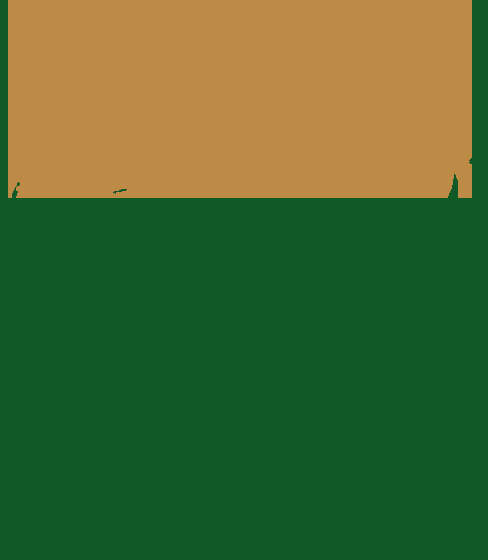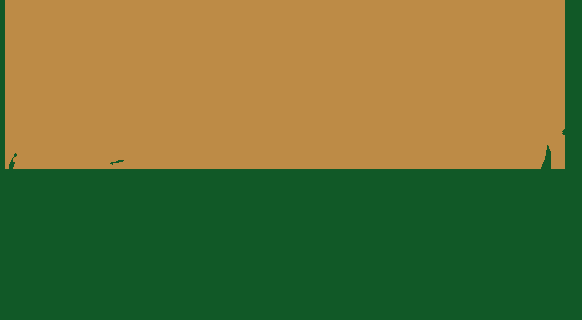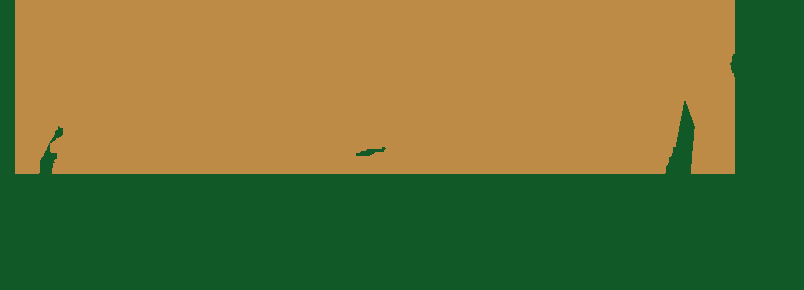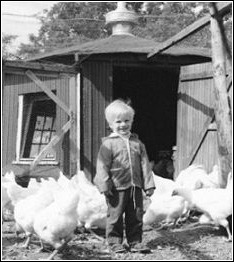
The Ned Bruha Story
Ned Bruha began working with wildlife as a very young boy, at the age of 7 he received his first wildlife control job assignment - prevent chipmunks from burrowing into and making their dens inside the area grave sites. From there his experience grew and his humane methods philosophy developed into what it is today. His story helps bring to light just exactly why humane methods are the best way to solve wildlife control problems.
The Skunk Whisperer's Story - An Autobiography By Ned Bruha
My parents purchased an old yellow brick schoolhouse which had doubled as the town hall, and then remodeled it to be my childhood home. My Wisconsin backyard included an old graveyard which produced one of my first jobs; mowing the lawn, filling in sunken graves, putting flags on Veterans' graves and keeping chipmunks from burrowing into the graves. This graveyard backed up to an orchard, acres of woods, and even more acres of farm and marsh land. Across the street lied a country block of farm crops and a wild critter paradise. This was home.

At age seven, I was given every child's standard issue Crossman 10-pump pellet rifle and a K-Mart Junior 410, along with cage traps. I was finally allowed to hang up my childhood axe handle "rifle" on the nail in the girls outhouse, forever in trade for the real things. My mission? Firearm responsibilities and stopping thirteen lined ground squirrels (otherwise known as chipmunks or ground squirrels) from burrowing into and making their dens inside of area grave sites. Every Memorial Day, I took delivery of new flags to replace the weathered flags that adorned the grave sites of war veterans in our cemetery. The old flags were removed and disposed of respectfully. Spring promised the beginning of my yearly mission - wildlife prevention and control. Badgers, woodchucks, and skunks undermined the woodpiles I personally stacked. Coyotes and badgers raided the chicken coop. Chipmunks desecrated graves. And I was in awe.
At age seven, when your father asks you why you cannot stop the chipmunks from desecrating a grave site, there's not a whole lot more to say than "I cannot shoot or trap them all, Dad." I will always remember when Dad said "Alright then, come with me boy". My father took me up to the chicken coop and we started digging. "Why are we digging, dad?"; then we hit metal. What we quickly unearthed was hardware cloth and chicken wire, along with some galvanized sheet metal, which was formed along the bottom edge all the way around the chicken coop in an "L" shape to keep predators from being able to dig under and steal some of my favorite childhood friends (Rhode Island Reds, Leghorns and Marans). Every Easter and on my birthday, these chickens would lay colored eggs and bring me gifts like toy tanks and candy, as well as the rabbits, who were all tucked safely away in rabbit hutches well above ground level, safely away from most of the predators.
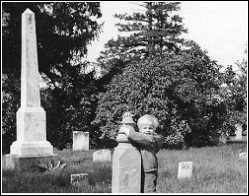
The grave sites were old and many were sunken, so when we placed the hardware cloth in the sunken hole and placed earth on top; it was an easy solution versus attempting the impossible: getting rid of all the chipmunks.

In order to get a closer look at a chipmunk den and tunnel system, I decided to exhume a chipmunk family that was making holes immediately under our swing set. Knowing full well that at lest two chipmunks were in the tunnel system, I blocked exits with garden spades and trowels. Not having another way out, a chipmunk popped out of the hole left open and placed his permanent mark on the left corner of my forehead. Still today, you can see the mark caused by the chipmunk bite. It became infected with ringworm, leaving a round scar.
I was taught that time spent in the woods in preparation for any hunting season was mandatory. Going out on opening day of deer season, sitting and waiting for the first deer to walk by was not hunting; that was simply shooting a deer, and therefore wrong. Although an avid gun collector and outdoorsman, I was never raised to kill everything, but rather to enjoy everything. Spotting scopes, along with wildlife and bird species identification books placed in the living room at two different viewing stations, allowed us to view from afar, appreciate, and learn wildlife habits. Knowing what food they preferred and what food they would eat if they had to, made me feel like I was part of their lives; and I was.
Sitting down in the woods on opening day was no more important than any other day in the woods, except for the fact that social pressures mandate a tagged deer. After two tagged deer later, and a lot more appreciation for their habits under my belt, I realized, as I still do, that I couldn't have cared less about bringing home a deer. I realized that knowing where the specific deer that you wanted would be, at what time, and why he would be there, was more valuable than shooting or eating that animal.
We all have people and events that influence and help change our views on wildlife conservation and control. A childhood and life-long friend, Tim, taught me an interesting lesson as a child that changed me forever and influenced me more so than anybody else did. Tim was, and is, an archery hunter. An archer must be much more "up close and personal" when hunting due to the limitations that a bow and arrow set. When Tim tagged a deer, he would take a part of that deer, such as the testes, and bury them in the woods at the place where he took that animal's life as a way of "returning the animal's spirit" back to nature. Observing this tradition at a young age taught me a much deeper respect for wildlife.
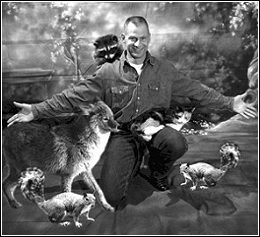
Annette King of Wild Heart Ranch, and Bonnie Bradshaw, wildlife rehabilitators, both told me that no-trap-no-kill wildlife control was a worthy cause, and they endorsed it wholeheartedly and they have helped us a lot along the way.
My ashes will be distributed in the creek that flows through Heyburn Wildlife Management Area in Oklahoma. The creek is almost always interrupted with beaver dams and it snakes through acres upon acres that I learned to know like the back of my hand.
One day in 1996, while exploring Heyburn WMA, I came across a gentleman who was releasing caged red squirrels. He explained to me that he trapped for a living and that he had been releasing countless red squirrels there for a decade. Because of how few there were there, I had previously decided that I did not want to hunt them. I could not comprehend how so many squirrels could be transplanted unsuccessfully. After all, the wild turkeys in Wisconsin were dragging their beards on the ground now, whereas when I was growing up, there were none. Why were red squirrels not being relocated successfully here? How did they die, or where did they all go? I knew every inch of this property; surely I would have seen where they called home if relocating wildlife was truly humane. The first several years of deer season in Oklahoma infuriated me. Enjoying public property was difficult compared to the hundreds of acres that I had access to as a child. The deer in Oklahoma were the size of greyhound dogs compared to the Wisconsin White-tailed deer. Hunting regulations were different than Wisconsin's were back then, and Oklahoma allowed for the use of a .357 revolver in a tree. Watching the greyhound dog sized doe walk under my tree and sniff around knowing that I was there, yet still unable to locate my whereabouts, always made me giddy. Simply dropping my Ruger .357 three screw would have tagged her. A half hour after season opening, I allowed her to walk three hundred yards, watched blaze orange appear, and the deer I had come to know over the last two months, to perish. The following year, after a considerable amount of scouting, one half hour after season opening; a group of city hunters came in laughing, talking, and smoking cigarettes. They planted their naive blaze orange bodies on their small coolers full of beer and soda, not more than 75 yards from me. After they were gone (never once noticing that they were within 75 yards of another hunter), I walked past where they sat, and I picked up their beer and soda cans, along with their cigarette butts with lipstick on a few of them. I shredded my hunting license and placed it in one of the cans, before placing it in the garbage at home.
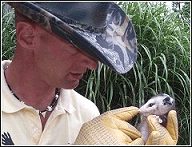
We continue to develop their ecosystem into roads and houses. If I was a squirrel, raccoon, flying squirrel, or opossum and you had a hole leading into an attic full of warm, fuzzy insulation, I would be silly not to move in. If you provided me with a tree for a ladder onto your rooftop, it would be ridiculous not to utilize it. If you laid new sod in your backyard and then watered it excessively, causing more grubs to come to the surface, I would be silly not to partake of the grubs and move into your crawlspace because you left the crawlspace door open. If I was a rat and you provided me with free bird food, it would be suicidal not to accept the handout and create a new territory. If I was a snake, it would not be within my nature to resist moving onto your property, living under your raised outbuilding, and to partake of the abundant rats and mice brought about by your feeding the birds. If you refuse to stop feeding the birds, expect trouble. If you refuse to quit feeding the birds, also remember that when you go on that winter vacation and your feeder is empty, you very likely will have a negative impact on the lives of many birds that have become totally dependant on your bird food. If this form of common sense is a sign of weakness, I am a camouflaged, wet noodle.
Not being allowed to watch television very often growing up was obviously beneficial to my future. Although I missed out on The Dukes of Hazard and Marty Stouffers Wild America; I gained a wealth of knowledge and an understanding heart via time spent outdoors.
Deep down, nobody really wants their nuisance wildlife to suffer or be killed. I know that if people understood that altering their immediate surroundings would not only be a cost effective solution, but would also allow them to coexist, they would do so. People know what they are taught and grow up with. I know that if folks understood that a raccoon had a few other dens within walking distance of your attic, that they would not relocate or kill them so quickly. So many people were raised so differently that their immediate response is "Kill the raccoon, kill the squirrel, or kill the rat that is costing me money". My upbringing has taught me other solutions.
My entire family is, and was, teachers. What is even more rewarding than allowing clients to coexist with wildlife is teaching children and potential new Skunk Whisperer office prospects how to co-exist and share this dream. If you do what you love for a living, you will never work a day in your life. My father told me that in this day and age, making a living doing what you loved was a rare opportunity, and that this was the smartest thing I have ever done. Change is scary though. Many nuisance wildlife control operators cannot fathom not removing the "nuisance" animals and say that it cannot work or should not be done. If common sense, heights, hard work and money do not offend you, perhaps you can assist us in showing them what crow tastes like, and proving them wrong. You will be bettering yourself, wildlife and the great outdoors too.
If you are a sportsman, hunter, fisherman, friend, mother, father, brother or sister, and you have the chance to take somebody younger out to the woods to observe the wildlife this week, do so. You will both be wealthier and healthier from the experience, and who knows maybe they will take a similar path someday."

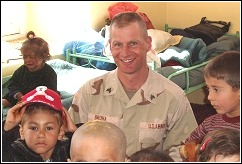
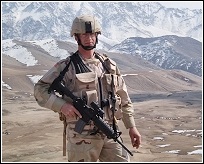
Photo Descriptions: In order from top to bottom 1 - A very young Ned Bruha posing with his good friends, the chickens; 2 - Ned as a young boy in the cemetery behind his house where he first learned to appreciate wildlife and humanely exclude chipmunks from graves; 3 - A pesky chipmunk like those who inspired Ned as a young boy; 4 - Ned Bruha today as he strikes an Ace Ventura like pose; 5 - Ned working with an orphaned young opossum during a wildlife control mission; 6 - Ned visiting an orphanage during his military service in Afghanistan; 7 - Ned in front of the Hindu Kush Mountains in Afghanistan where he served as part of an embedded training team assigned to help train President Karsais Palace Guards and the Ministry of Defense Soldiers.
1242 SW Pine Island Rd., Suite 310
Cape Coral, Florida 33991-2126
help@totalwildlifecontrol.com









